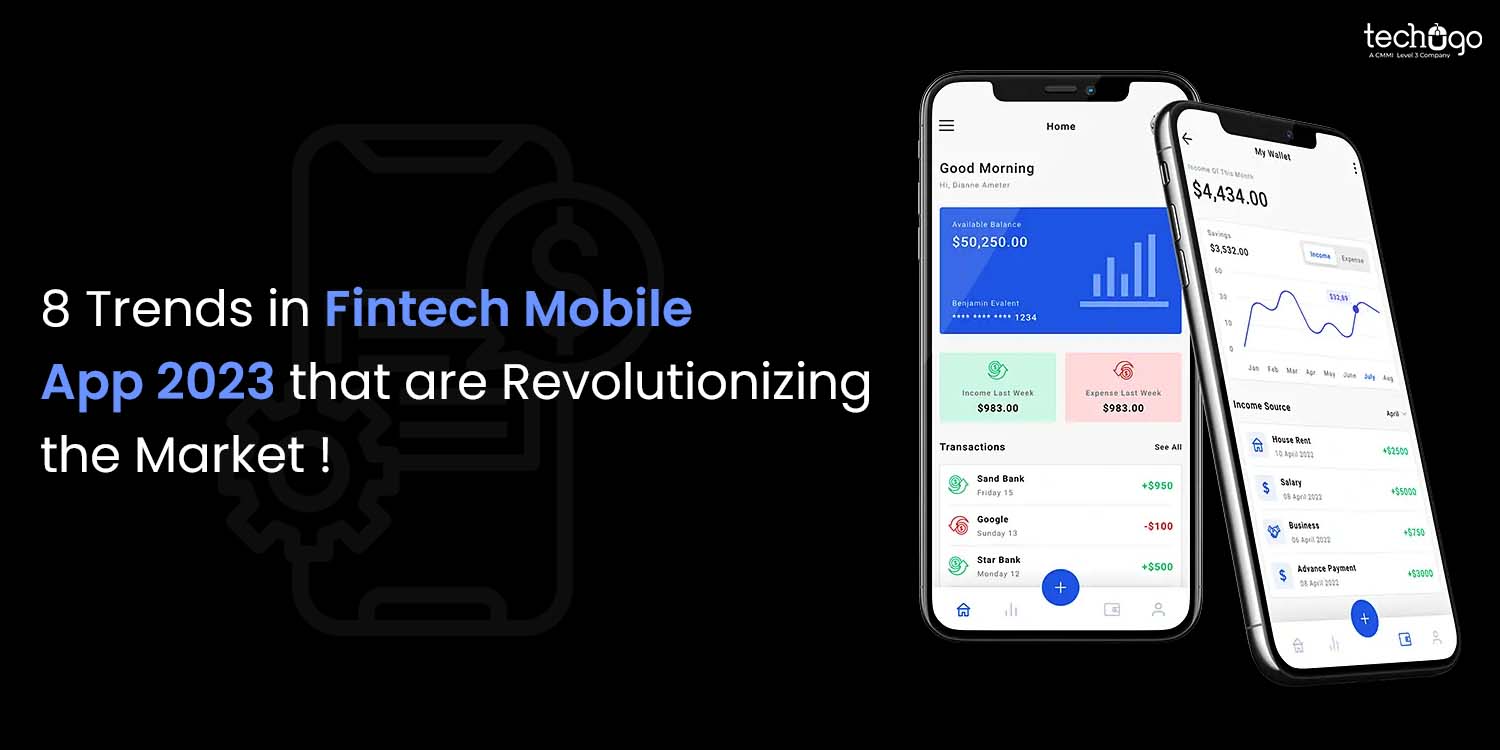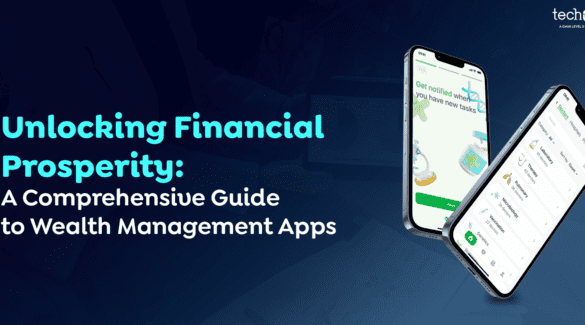6 Mar 2023
8 Trends in Fintech Mobile App 2023 that are Revolutionizing the Market !
Surbhi Bhatia

COVID-19 has raised awareness of the significance of digital technology which is why many businesses have embraced the latest trends in technology to compete. In addition, customer demand is increasing, which has made it necessary for enterprises to move into the digital realm.
Industries like education, entertainment, healthcare, food, and Fintech are searching for top mobile app development company to provide them with the most effective solutions to increase their client base.
In this article, we will provide Fintech Trends in 2023. As we all know, many entrepreneurs are considering creating a Fintech service business. First, however, they must start the field by launching the help of a Fintech application to get off to a successful beginning. Continue reading to learn more about the Fintech app development process and the cost.
Fintech’s origins (it is longer than you imagine)
In 1918, The U.S.;the Federal Reserve built the Fedwire Funds Service, which is still in operation. By using Morse code that was used on public telegraph lines, the Fed made sure it was inevitable that there was a consistent exchange rate for the U.S. dollar was worth the same in Pittsburgh as it was in Poughkeepsie and Seattle and San Antonio and that interbank transfers could be made without lengthy and risky transfers of gold or cash.
The year 1995 was the first time Wells Fargo — Yes, the same firm which operated Pony Express in 1861 Pony Express in 1861 -created the first online check account accessible.
On May 22nd, 2010, a day that will always be known for its significance as Bitcoin Pizza Day, Laszlo Hanyecz was the first who used cryptocurrency to purchase the physical item Papa John’s Pizza. Hanyecz paid 10,000 bitcoins for the pizza, worth about $350 million at the time of writing. (I hope it was delicious.)
When we think of Fintech in the present, We think of technology that can manage to send, invest in stores, and increase the value of our cash.
A Revolution: Fintech “Rewrote The Rules”
Fintechs have revolutionized customer service, but traditional banks offer essential customer solutions. The new age of startups in finance utilizes unconventional channels such as social media to offer customer service 24 hours a day. They also use chatbots to provide continuous contact with their customers.
The population is adapting to the digital transformation of the banking and finance industry—shifts dramatically. The rate of adaptation increased significantly after the COVID impact, in which physical proximity is no longer as important. After a slowing 2020 investor demand, the market is eager to invest in fintech.
After looking at these statistics, you can confidently choose to create financial software. To assist the reader, in this article, we’ve covered the most critical concerns that one could confront while on the road to establishing a successful fintech startup.
Also Read – How AI Chatbot App Development Will Transform The Industry in 2023?
Critical Challenges Faced in Fintech App Development
Launching a Fintech app will present two types of challenges: Strategic and technical.
Strategic challenges include:
- Preparing for the presentation deck.
- Getting funds.
- Ensuring compliance with government regulations.
These issues are related to the organizational structure rather than the application itself.
Technical challenges are directly related to the concept, development, and promotion of this Mobile App. These issues relate to the engineering and technology of the App.
We will discuss the mix of both problems, so you will get an overview of the field. We also have tried to provide solutions to each situation with evidence-based solutions.
Understand Business Goals and Target Audience
Recognizing gaps in the market and conceiving solutions that can be accomplished through an app.
The main issue is conceiving an idea that can work on paper and in the real world. Fintech is a wide-ranging field, and it is possible to select from many different areas according to their feasibility and potential for innovation.
Finalizing Tech Stack
Choosing a technology that could provide the highest usability for mobile devices while ensuring that development factors are aligned.
The tech stack is the architecture upon which the application is constructed. This is the front end, the database server, and the operating System. The most influential tech stack gives the highest technological benefits for implementing the App and takes minor work to develop the application.
Identifying App Development Complexities
Categorizing and documenting what features the App is expected to offer along with timelines for rollout.
An app for mobile devices can be designed to tackle 100 issues at once, with minimal impact, or solve one problem at a time with significant impact. Knowing which issues you want to tackle will determine your App’s complexity. The App’s complexity must be balanced against the resources available to develop the application.
Defining the Right User Experience
Identifying the components that make up your User Experience of the App to ensure the most optimal usability standards.
User Experience (UX) is the term used to describe the user’s experience, interaction, and the design of interfaces. It is what the App will appear and feel. UX is designed in many ways, and picking the most appropriate one can be difficult. It usually grows with time, but the framework and the standard need to be established first.
Ensuring Data Privacy and Security
Identifying the most secure practices for data security and security to implement within the Fintech app development to ensure smooth operation.
Fintech Apps require extra caution and strict security standards since the information is vital. Therefore, the System handling the data needs to be secure enough to ensure that the user’s data is safe and available throughout the day. In addition, it should comply with the privacy guidelines published in the region where the App operates.
The application complies with Government Regulations
To ensure that your App technology and business strategy meet the requirements of government agencies.
Most government agencies already have Data Security and Fintech Laws that protect the consumer’s interest. As a Fintech solution and a Fintech solution, these laws will apply to all aspects of the project, from technology to the business model. Therefore, implementing these guidelines and including compliance requirements in your application are inevitable aspects of the project.
There are severe sanctions if mistakes or inconsistencies are discovered within the App or the business surrounding it.
Integration of Artificial intelligence and Big Data
Designing strategies to use AI and Big Data ideally for business advantages while overcoming technical obstacles.
70% of the major financial institutions across the globe anticipate that AI will be a permanent element of Fintech between 2020 and 2023.
It is essential to have a robust AI system in place to get cutting-edge insights into the business benefits. This demonstrates the ease of using AI and Big Data in your Fintech App. So easy to implement, and such solutions often result in many technical issues.
The fintech sector has increased over the past few years and is likely to proliferate. We will highlight some recent trends in Fintech and discuss how they could transform the banking industry in the next decade.
Top 8 Fintech Industry Trends for 2023
The fintech sector has grown exponentially over the last few years and is predicted to proliferate. We review some recent trends in Fintech and discuss how they could alter how banks operate over the next decade.
Machine learning and artificial intelligence will benefit all sectors
AI can improve business operations by finding fraud, spotting potential security risks, and many others. As a result, customers and businesses can benefit from better security management, lower operating costs, and personalization of banking experience and automated processes.
FinTech advancement trends for 2023 suggest :
AI is a key element driving the sector’s future expansion
For instance, the case of Royal Bank of Canada utilizes AI to improve the user experience and bring new applications to customers faster. The RBC’s private AI cloud can process millions of information points every second, which allows a business to create and implement AI-powered apps more quickly.
The first truly digital natives Gen Zers are also expected to play a significant role in the discussion about payments innovations. This is because they have been the first group to be able to use cashless transactions and therefore are more familiar with the latest innovations.
Banking with digital-only is coming soon
There is no reason to go to any brick-and-mortar bank and no long wait times to challenge your patience, and no grueling paperwork to handle. So, digital-only banks have plenty to offer. As a result, their numbers and revenues are rising worldwide (Global Market Insights, 2019). However, they are also among the primary reasons that bank branch visits are projected to drop by 36 percent between 2017 to 2022. (The Financial Brand, 2021).
If you have a digital-only bank, You can reset pins comfortably at home. Create bill payments with a snap-a-pic, access handy tools for managing expenses and swift balance review functions, and real-time access analytics.
Take your time signing up for one of these disruptive fintech companies. Consider that, just like other companies, they are bound to be targets of the criminals in the financial sector lurking across the web. This is a significant factor to consider when making your choice in a time in which fraud and financial fraud are the most prevalent internet-based crime.
Microservices
Microservices are a different way to increase security in Fintech in 2023. They also offer great value for money and will gain popularity next year.
Also known as a small-form factors (SFF) servers architecture, microservers are dependable, robust, dense, and dense. Each microserver is designed to minimize power consumption, size, and capital costs. Combined, they can host small-scale applications and data that do not require all the services of traditional enterprise hardware.
Autonomous Finance
Autonomous finance, also known as “self-serving money,” is an AI-powered technology that allows users to develop and execute the financial plan of an app. First, users must fill in their own goals and balances. Then, the digital assistant will assist them in saving, investing, and transferring money to charities. Because of these features, autonomous finance is set to change the face of personal finances.
Acquiring Systems
With increased regulatory attention on transparency and security and the advancement of mobile payments and technology, the acquisition of technology will be one of the hottest trends in Fintech by 2024. This is particularly true in fraud prevention and new product development.
Innovative payment services providers like Klarna or Stripe are paving new ways to provide adequate customer service online with their latest digital products, thereby making the experience of shopping online even more.
Innovative payment methods
Fintech innovations in payment comprise a range of components. For example, payments via mobile, contactless payment intelligent speakers, mobile wallet technology, ID verification technology, AI, and machine learning are all security technologies.
Based on 2020 data, the most critical change in the world of payments is the increase in mobile payments, specifically during the COVID-19 pandemic, where more transactions were transferred to the internet (PaymentsJournal, 2020). Mobile payments do not just cover online purchases. In-store transactions are projected to be higher than 2.7 billion in 2022, bringing all commerce transactions on the internet to more than $5.4 trillion in 2025. (Payvision, 2020).
The increased focus on exploring new avenues for business
Even if it means working with rivals.
Goldman Sachs recently did this along with Elinvar by acquiring an investment in the field of digital banking (Finextra Research, 2019,). Goldman Sachs is one of many in this area. Visa has also announced an equity fund to Fintech app development company which is expected to boost Visa’s standing in digital banking (MarketWatch, 2020).
These are relatively recent with well-documented partnerships. They are likely to be expected in the coming years. FinTechs only sometimes have the capital or the infrastructure to manage their clients’ needs. Banks, as we have previously known, were only sometimes swift and agile enough to adapt to market conditions that are rapidly changing. FinTechs can assist with this. We anticipate more collaboration over the next few years.
How Much Does FinTech App Development Cost?
What is the cost to build a FinTech app? First, let us review what is the cost to develop a mobile app based on the application size.
Small Project
Between $30,000 and $50,000 is the cost for a single-platform application that has basic capabilities and an intuitive layout.
Medium Sized
A more complicated system with more features and the latest technology could cost you $50 to $85,000.
Enterprise
A complicated Fintech app development of a greater dimension will cost around $ 80,000.
Be aware that the following aspects affect the final cost of designing for Fintech application:
- The country where developers are situated
- The number of your requests
- Functional complexity
- Further expansion
Conclusion
FinTech developments in 2023 prove that digitalizing the existing digital infrastructure is not a snobby assertion. Development of mobile apps as well as, more generally, FinTech app development, necessitate an entirely new perspective.
If you find this article beneficial, please pass it along to your circle of friends. Connect withTechugo, an on demand app development company to find the most effective way to achieve your goals. Thank you for taking the time to read.
Get in touch.
Write Us
sales@techugo.comOr fill this form



